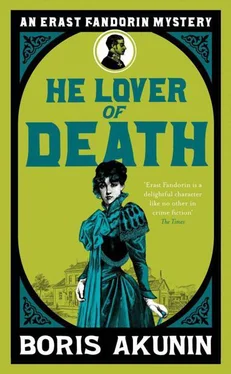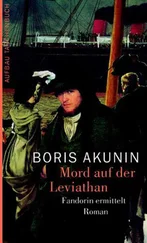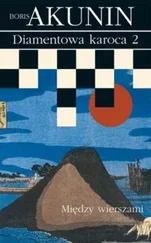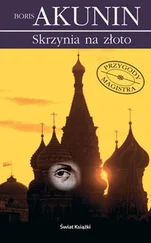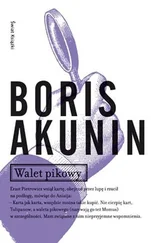And at the same time he changed his name, so no one could pick up his trail. At first he was going to call himself something ordinary, but then he decided that if he was going to change his name, it might as well be something grand, in keeping with his new life. He put himself down in the register of guests Apollon Sekandrovich Schopenhauer, commercial traveller.
That night he dreamed of all sorts of things. Steamy scenes of passion (about Death), and frightening scenes of horror (the Prince climbing in through the window, a knife in his teeth, and Senka getting tangled up in the blanket so he couldn’t get out of bed).
At dawn Senka was woken by a loud knocking at the door.
He sat up and clutched at his heart, thinking the Prince and Deadeye had tracked him down. He was all set to scarper down the drainpipe – just as he was, wearing next to nothing – but then he heard Masa’s voice.
‘Senka-kun, open door!’
Phew! You can’t imagine how relieved Senka felt at that. He didn’t even wonder how the Japanese had found him there so quickly.
He opened the latch, and Masa walked quickly into the room, followed by (well, blow me down!) Erast Petrovich in person. They both looked gloomy and severe.
Masa stood by the wall, and his master took Senka by the shoulders, turned him to face the window (it was still early, morning twilight) and said briskly. ‘Now, Apollon Sekandrovich, no more p-playing the fool. I can’t afford to waste any more time on your m-mysterious personality. Tell me everything you know: about the m-murder of the Siniukhins and about the murder of the Samshitovs. This has to be stopped!’
The Sam . . . Samshitovs!’ Senka exclaimed, choking over the name. ‘B-but I thought
Now he’d started stammering too – was it infectious?
‘Get d-dressed,’ Erast Petrovich told him. ‘We’re leaving.’
And he walked out into the corridor without bothering to explain anything else.
As he pulled on his trousers and shirt, Senka asked his sensei: ‘How did you find me?’
‘Cab numba,’ Masa replied tersely, and Senka realised Madam Borisenko had remembered the cabby’s number, and he’d told them where he took his fare.
So much for keeping things secret and covering his trail. ‘And where are we going?’
‘To the scene of the clime.’
Oh Lord! What good will this do? But Senka didn’t dare argue. This pair would use force, drag him out by the scruff of his neck (we know, we’ve had a bit of that already).
Senka was feeling terribly nervous all the way to Maroseika Street. And the closer they came, the worse it got. So Ashot Ashotovich hadn’t been arrested after all? He’d been done in? Erast Petrovich had said ‘the Samshitovs’ – so that meant they’d killed his ever-loving wife? Who, robbers? And what did he, Senka Spidorov, have to do with it?
There were no police outside the shop, but there was a string with a seal across the door, and a light burning inside. The street was still empty, the shops hadn’t opened, or a crowd of people would have gathered for sure.
They went into the house from the yard, through the back entrance. A police official in a blue uniform was waiting for them –quiet, nondescript, wearing specs.
‘You took your time,’ he rebuked Erast Petrovich. ‘I asked you . . . I phoned you at midnight, and now it’s half past five. I’m taking a risk here.’
‘I’m sorry, Sergei Nikiforovich. We had to f-find an important witness.’
Even though Erast Petrovich had called him important, Senka still didn’t like the sound of that. What was he supposed to have witnessed?
‘Tell us about this killing,’ Erast Petrovich said to the official. ‘What was it p-possible to establish from an initial examination?’
‘Come this way, please,’ said Sergei Four-eyes, beckoning to them. They walked through from the hall into the rooms. ‘The jeweller had a kind of office here, at the back of the shop. The living space was upstairs. But the criminal didn’t go up there, it all happened down here.’ He glanced at his notepad. ‘The doctor believes that Nina Akopovna Samshitova, forty-nine years of age, was killed first, with a blow to the temple from a heavy object. Her body was lying just here.’
On the ground by the door there was a rough outline of a human figure, not a very good likeness, and beside it there was a dark patch. Blood, Senka guessed, and shuddered.
‘The criminal tied up Ashot Ashotovich Samshitov, fifty-two years of age, and sat him in this chair. As you can see, there’s blood everywhere: on the headrest, the arms, the floor. And both veinous and arterial, different oscillatory fluctuations . . . I’m sorry, Erast Petrovich, I’m not being very clear, I don’t know medical terminology very well,’ the official said, embarrassed. ‘You were always at me, trying to get me to study a bit, but the new bosses didn’t require it, so I never got round—’
‘Never mind that,’ Erast Petrovich interrupted. ‘I understand: Samshitov was t-tortured before he died. Was a knife used?’
‘Probably, or else they stabbed him with a pointed object.’
‘And the eyes?’
‘What about the eyes?’
‘Were the b-bodies’ eyes put out?’
‘Ah, you’re thinking of the Khitrovka murders ...’ Sergei Nikiforovich shook his head. ‘No, the eyes weren’t put out, and the overall picture of the crime is rather different, too. So it has been decided to make this a separate case from the Khitrovka Blinder murders.’
The Khitrovka B-blinder?’ said Erast Petrovich, wincing. ‘What a stupid name! I thought only newspapermen used it.’
‘It was thought up by the superintendent of the Third Myasnitsky Precinct, Colonel Solntsev. The reporters pounced on it, although, of course, from a grammatical—’
‘All right, to hell with the g-grammar,’ said Erast Petrovich, walking round the room. ‘Shall we go upstairs?’
‘No point. It’s quite clear that the killer didn’t go up there.’
‘Killer? Not killers? Has it been established that there was only one c-criminal?’
‘Apparently so. The neighbours testified that Samshitov never served more than one customer at a time, he only let one in the shop then locked the door after them immediately. He was very afraid of being robbed, Khitrovka’s not far off, after all.’
‘Signs of robbery?’
‘None. Nothing’s been taken, even in the shop. There are a few trinkets lying in the shop window there, but they’re not worth very much. I told you, everything happened in this room.’
Erast Petrovich shook his head and walked through into the shop. The official and Masa followed him. And Senka too – so as not to be left alone in a room splattered with blood.
‘And what’s this?’ asked Erast Petrovich, pointing to the birdcage.
The parrot Levonchik was lying in it with his head thrown back.
Sergei Nikiforovich shrugged. ‘Parrots are nervous birds, sensitive to loud sounds. And there must have been plenty of screaming and groaning . . . His heart gave out. Or perhaps he was left unfed too long.’
‘The cage d-door’s open. Yes and . . . Aha, t-take a look, Masa.’ Erast Petrovich picked up the little body and handed it to Masa.
The Japanese clicked his tongue: ‘They wrung it’ neck. Murda.’
‘Yes, it’s a pity the coroner didn’t examine it,’ the policeman chuckled, evidently thinking that the Oriental was joking, but Senka knew that for his sensei a soul was a soul, whether it was a man’s or a bird’s.
‘How low the p-professionalism of the Moscow d-detective police has sunk,’ Erast Petrovich intoned sadly. Ten years ago such c-carelessness would have been unimaginable.’
‘Don’t I know it.’ Sergei Nikiforovich sighed even more bitterly. ‘Things aren’t what they were in your day. You know, I get no satisfaction from the work at all. All they want are results, convictions, they’re not interested in proving anything. The triumph of justice doesn’t even come into it. Our bosses have different concerns. By the way’, he said, lowering his voice, ‘I didn’t mention it on the telephone . . . Your presence in Moscow is no secret. I happened by chance to see a secret instruction on the desk of the chief of police: your place of residence is to be determined and you’re to be put under secret observation. Someone’s recognised you and reported you.’
Читать дальше
